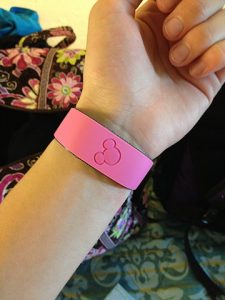On Friday, February 24th, the sons of a deceased inventor filed a patent infringement suit in the U.S. District Court for the Eastern District of Texas (E.D. Tex.) targeting Walt Disney Company (NYSE:DIS) subsidiaries Walt Disney Parks and Resorts Worldwide as well as Disney Online. The suit alleges that the wireless communication capabilities of Disney’s MagicBand wristband products infringe upon a patent issued to Charles C. Freeny, Jr. back in December 2002.
The sons of Charles Freeny Jr. are asserting their rights to a single patent-in-suit, U.S. Patent No. 6490443, titled Communication and Proximity Authorization Systems. Perhaps not your typical or average patent, the ‘443 patent has some 135 patent claims, which relate to a proximity authorization unit, a proximity service unit, a method of using the proximity authorization unit, or a system for implementing the proximity authorization unit. The majority of the claims, however, are drafted specifically to cover the devices (i.e., the proximity authorization and service units).
Generally speaking, the ‘443 patent discloses a proximity service unit for providing at least one predetermined service for use with multiple types of wireless devices. The proximity unit further has a multiple channel wireless transceiver capable of receiving multiple request authorization codes for simultaneous communication with a plurality of wireless devices and a legacy activation unit which provides at least one predetermined service for each wireless device. The patent’s summary of the invention section indicates that the invention covered by the patent relates to a pico pay phone system such as those offered by telecommunications companies and available through kiosks installed in airports or large hotels.
The official complaint filed by the sons of Charles Freeny Jr. alleges that the MagicBand wristband product with wireless communication capabilities infringes upon at least one claim of the ‘443 patent. The Disney MagicBand, sold online and available at Disney amusement parks, enable wearers to gain entry to hotel rooms or perform purchase transactions. The suit specifically alleges that the MagicBand infringes independent claim 90 of the ‘443 patent, which is directed at a proximity authorization unit for use with proximity service units. The plaintiffs argue that the MagicBand constitutes such a proximity authorization unit, which communicates with proximity service units over different signals, including radio frequency identification signals (RFID), to receive predetermined services. The plaintiffs are seeking a judgment of infringement of the ‘443 patent, a permanent injunction enjoying Disney from infringing the ‘443 patent in the future and a judgment ordering Disney to pay damages for its infringement.
This is not the first time that Disney’s MagicBand wireless communication products have been the target of patent infringement litigation. In April 2015, radio frequency system developer InCom Corporation of Sutter, CA, filed a lawsuit in the U.S. District Court for the Central District of California (C.D. Cal.) alleging that Disney’s MagicBands infringed upon InCom patents covering audience tracking system technologies. Last August, the two companies agreed to settle the case after InCom had alleged that Disney sold about 10 million MagicBands at $12.95 each after being notified of the potential infringement.

![[IPWatchdog Logo]](https://ipwatchdog.com/wp-content/themes/IPWatchdog%20-%202023/assets/images/temp/logo-small@2x.png)



![[Advertisement]](https://ipwatchdog.com/wp-content/uploads/2024/04/Patent-Litigation-Masters-2024-sidebar-early-bird-ends-Apr-21-last-chance-700x500-1.jpg)

![[Advertisement]](https://ipwatchdog.com/wp-content/uploads/2021/12/WEBINAR-336-x-280-px.png)
![[Advertisement]](https://ipwatchdog.com/wp-content/uploads/2021/12/2021-Patent-Practice-on-Demand-recorded-Feb-2021-336-x-280.jpg)
![[Advertisement]](https://ipwatchdog.com/wp-content/uploads/2021/12/Ad-4-The-Invent-Patent-System™.png)






Join the Discussion
One comment so far.
Atari Man
March 5, 2017 02:22 amAs far as I know, Disney doesn’t operate any parks, hotels or other facilities in Texas, so how does the EDTx court have jurisdiction to hear this case?